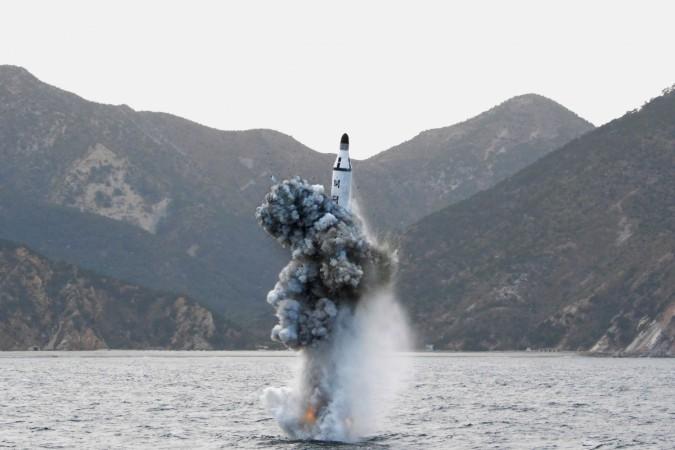
North Korea will cease nuclear tests if the United States stops its annual military drills with South Korea, North Korean Foreign Minister Ri Su Yong told the Associated Press hours after Pyongyang test-fired a ballistic missile from a submarine.
Ri said the international sanctions would not stop the Democratic People's Republic of Korea (DPRK) from continuing its nuclear programme, which Pyongyang started in self-defence against threat from the U.S. The suspension of military exercises in the Korean peninsula would pave the way to settle all disputes through dialogue, he added.
"Stop the nuclear war exercises in the Korean Peninsula, then we should also cease our nuclear tests," Ri told AP. If the drills are suspended "for some period, for some years...new opportunities may arise for the two countries and for the whole entire world as well," he added.
Pyongyang reportedly sees the drills that started on March 7 as an attempt by the U.S. and the South to invade the North. It had warned Washington and Seoul of "pre-emptive strike" if the military exercises proved to be a threat to the country.
"If we continue on this path of confrontation, this will lead to very catastrophic results, not only for the two countries but for the whole entire world as well. It is really crucial for the United States government to withdraw its hostile policy against the DPRK and as an expression of this, stop the military exercises, war exercises, in the Korean Peninsula. Then we will respond likewise," Ri said.
"If they believe they can actually frustrate us with sanctions, they are totally mistaken. The more pressure you put on to something, the more emotionally you react to stand up against it. And this is important for the American policymakers to be aware of," he added.
The U.S. State Department, responding to Ri's remarks, said the drill is a demonstration of the U.S.'s commitment to its alliance with the South.
"We call again on North Korea to refrain from actions and rhetoric that further raise tensions in the region and focus instead on taking concrete steps toward fulfilling its international commitments and obligations," the U.S. State Department's Bureau of East Asia and Pacific Affairs spokeswoman Katina Adams said.
Ri was in New York for the United Nations' meeting on sustainable development when he gave the interview to AP. It is not common for the North to give interviews to Western media.
Missile test
North Korea fired a submarine-launched ballistic missile (SLBM) from a 2,000-ton Sinpo-class submarine off its east coast at around 6:30 p.m. (local time) on Saturday, Yonhap News Agency quoted South Korea's Joint Chiefs of Staff (JCS) as saying.
North Korean leader Kim Jong Un called it a "great success," according to ABC News. "It fully confirmed and reinforced the reliability of the Korean-style underwater launching system and perfectly met all technical requirements for carrying out ... underwater attack operation," state-run Korean Central News Agency said.
Pyongyang "is now capable of hitting the heads of the South Korean puppet forces and the U.S. imperialists anytime as it pleases," Kim said.
However, Yonhap quoted the JCS as saying that the launch was not successful as the SLBM had a flight range of 300 km, but it travelled only about 30 km. A South Korean government source also told the agency: "This projectile, which is believed to be an SLBM, was airborne for a couple of minutes." Seoul has been keeping track of Pyongyang's nuclear programme.















